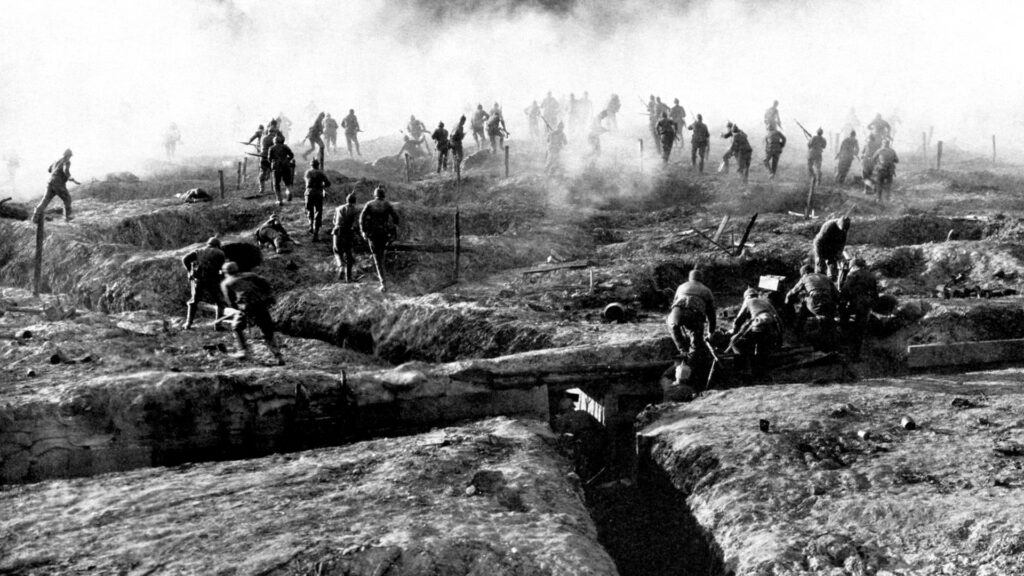The content introduces the reader to the spark that ignited World War I, the assassination of Archduke Franz Ferdinand of Austria-Hungary. It explains the circumstances surrounding the assassination and how it led to Austria-Hungary issuing an ultimatum to Serbia. The rejection of the ultimatum and the activation of alliances among major powers further escalated the conflict, eventually resulting in a global war. The content also highlights the impact of World War I, including the disintegration of empires and the Treaty of Versailles, which laid the groundwork for future conflicts. Overall, it emphasizes the complex causes and far-reaching consequences of World War I.
From Assassination to All-Out Conflict: The Spark that Ignited World War I
Introduction
World War I, also known as the Great War, was one of the deadliest conflicts in human history. Lasting from 1914 to 1918, it involved major world powers and reshaped the political, social, and economic landscapes across the globe. While there were various underlying causes for the war, the catalyst that set the conflict in motion was the assassination of Archduke Franz Ferdinand of Austria-Hungary in June 1914.
The Assassination of Archduke Franz Ferdinand
On June 28, 1914, Archduke Franz Ferdinand, the heir to the Austro-Hungarian Empire, and his wife, Sophie, were visiting Sarajevo, a city located in present-day Bosnia and Herzegovina. During their visit, a Bosnian Serb nationalist named Gavrilo Princip shot and killed the couple. This act of political terrorism shocked the world and set off a chain of events that would lead to a global conflict.
Austria-Hungary’s Ultimatum
The assassination of Franz Ferdinand deeply angered Austria-Hungary, which saw it as an attack on their sovereignty. They believed that Serbia, a neighboring country that shared a border with Bosnia, had played a role in the plot, and demanded justice. In response, Austria-Hungary issued an ultimatum to Serbia on July 23, 1914, presenting a series of demands that Serbia had to meet within 48 hours.
Serbia’s Rejection and Support from Allies
Serbia’s response to the ultimatum fell short of Austria-Hungary’s expectations, as the Serbian government agreed to most of the demands but rejected others. Seeing Serbia’s refusal as a direct challenge to their authority, Austria-Hungary declared war on Serbia on July 28, 1914. This triggered a complex series of alliances and diplomatic maneuvers among the major powers of Europe.
The Domino Effect: Alliances are Activated
The alliance system that had been developed in Europe prior to 1914 meant that an act of aggression against one nation could quickly draw multiple others into a conflict. Russia, a traditional ally of Serbia, mobilized its forces in response to Austria-Hungary’s declaration of war. In turn, Germany declared war on Russia as a supporter of Austria-Hungary. France, bound by treaty to Russia, entered the conflict as well. The domino effect continued, with Germany invading Belgium and Britain, committed to protecting Belgian neutrality, declaring war on Germany. Within weeks, Europe was engulfed in all-out war.
Global Escalation and Involvement
As the conflict escalated, more nations from around the world became involved in the fighting. The Central Powers, led by Germany, Austria-Hungary, and the Ottoman Empire, battled against the Allied Powers, including France, the United Kingdom, Russia, and eventually the United States, which joined the war in 1917. In addition, various colonies and territories of the major powers were drawn into the conflict, making it truly a global war.
The Impact of World War I
The eruption of World War I had far-reaching consequences that changed the course of history. The war resulted in millions of deaths, both military and civilian, due to the scale of combat, the use of modern weaponry, and the harsh conditions on the battlefield. It brought about the disintegration of empires, including the Austro-Hungarian Empire, the German Empire, and the Russian Empire.
The Treaty of Versailles, signed in 1919, imposed harsh terms on Germany and its allies, which fuelled resentment and eventually laid the groundwork for the rise of Adolf Hitler and the outbreak of World War II. The war also led to significant political and social changes, including the rise of nationalism, the women’s suffrage movement, and the advancement of technology, which propelled the world into a new era.
Conclusion
The assassination of Archduke Franz Ferdinand may have been the spark that ignited World War I, but the underlying causes and complex web of alliances played significant roles in turning a localized incident into a worldwide conflict. The war’s immense toll and far-reaching consequences continue to shape our world today, serving as a reminder of the devastating impact that conflicts can have on nations and people around the globe.
